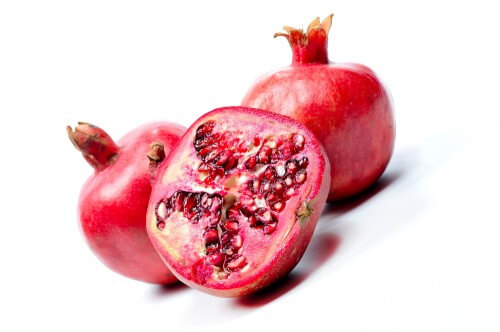This is what Professor Michael Aviram and his research team, from the Rappaport Faculty of Medicine at the Technion and the Rambam Medical Center in Haifa, discovered.

The combination of a low-dose statin together with pomegranate fruit extract (which contains antioxidants and phytosterols) in patients with excess cholesterol in the blood, significantly lowers the amount of cholesterol and inhibits the oxidation of cholesterol in the blood and cells. This is what Professor Michael Aviram and his research team, from the Rappaport Faculty of Medicine at the Technion and the Rambam Medical Center in Haifa, discovered. Their study was published this week in the scientific journal Atherosclerosis, and its conclusion is that the combination of a statin with pomegranate fruit extract helps inhibit the risk factors for the development of atherosclerosis and its consequences - heart attack or stroke.
The main risk factors for the development of atherosclerosis (deposition of cholesterol in the walls of the arteries that carry blood to the heart and brain) and its consequences - a heart attack or stroke, are the quantity and quality of cholesterol in the blood.
"As the amount of cholesterol in the blood increases, and as the quality of cholesterol in the blood decreases (an increase in the degree of oxidation of cholesterol), there is an acceleration in the development of atherosclerosis. Our job is to treat the lowering of cholesterol levels in the blood and delay its oxidation," explains Professor Aviram. "The treatment of a high amount of cholesterol in the blood is through drugs - mainly statins, which inhibit the creation of cholesterol in the human body, and lower its level in the blood. The treatment of poor quality cholesterol, that is - its over-oxidation, is through antioxidants (antioxidants) whose main source is in plants (in the peel of fruits and vegetables). Although the treatment with statins to lower the cholesterol level is very effective against cardiovascular diseases, this treatment has very little effect on the oxidation of cholesterol. Furthermore, high-dose statin treatment has side effects - mainly significant muscle pain, and we are looking for a treatment that will be without the side effects."
"A low dose of statins can indeed prevent the side effects," adds Professor Aviram, "but a low dose of a statin reduces its effectiveness in lowering the amount of cholesterol in the blood. In a separate study, we discovered that adding phytosterols (cholesterol-like molecules found in fruits and vegetables) helps lower blood cholesterol levels in a different mechanism than statins. A mechanism that inhibits cholesterol absorption. But phytosterol accelerates the oxidation of cholesterol. Therefore, the phytosterols must be given together with effective antioxidants. The pomegranate fruit provides an answer to both the amount of cholesterol and its oxidation, since it contains highly effective antioxidants (funicalagin). Therefore, the pomegranate fruit inhibits the oxidation of cholesterol, and in addition, since it contains phytosterols, it also lowers the cholesterol level, without the side effects observed with high doses of statins."
In the photo: Professor Michael Aviram. (Photo: Technion Spokesperson)

One response
Link to the article?